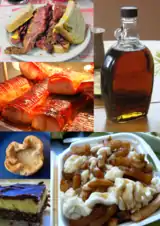Cuisine of the Maritimes
The Maritimes region of Canada has some unique foods; the region has foodstuffs that are indigenous to the area and cultural phenomena has brought non-native foods to the area. The region is in Eastern Canada, and comprises three provinces: New Brunswick, Nova Scotia, and Prince Edward Island. On the Atlantic coast, the Maritimes are a subregion of Atlantic Canada. Some of the cuisine has its origins in the foods of the indigenous peoples of Nova Scotia.
 |
| Part of a series on |
| Canadian cuisine |
|---|
|
Common foods and dishes
Poutine râpée,[1] an Acadian pork-potato dish, and rapée/rapie pie,[2] an Acadian poultry dish, are Maritime-based. Seafood is of great importance in the Maritimes and it is prepared in many ways.[3] Lobster rolls are commonly found throughout the province of New Brunswick, and are a dish typical of the locals; these can be found in the United States as well, particularly in Maine, which adjoins the Province of New Brunswick, the only province with two official languages, French and English.[4] This is an indication of the culture found in New Brunswick, the province between Quebec and Nova Scotia.
Another common food among Maritimers is dulse; dulse is seaweed of a certain type and grows along the New Brunswick and Nova Scotia coasts. Some Maritimers eat dried dulse, a reddish-purple-to-black salty-tasting snack, eaten similarly to potato chips.[5] The popular Dulse, Lettuce and Tomato (DLT) sandwich is a dish found at the historic Saint John City Market.[6]
Potatoes, being a mainstay crop in New Brunswick and Prince Edward Island, are also a staple in Maritime cuisine. Hash Brown Casserole made with potato, cheese and cream dish and potato pancakes similar to Irish Boxty are very popular breakfast dishes.
Maple sugar, in many forms, from maple syrup (sirop d'érable) to maple-leaf-shaped crunchy candies, is an important sweet in Eastern Canada,[7] where sugaring-off excursions (involving 'tire d'érable sur la neige,' when the hot syrup is poured onto snow to crystallize) are one of the better winter activities. It is also an important export, economically.[8][9]
On Prince Edward Island, Cow's Ice Cream[10] is a brand found uniquely in the province, and dairy products in various forms are important to residents of the Maritimes. A popular variety of ice cream in the Maritimes, and also New England, is grape nut ice cream.
Wild blueberries grow in abundance in the Maritimes and are commonly picked, although they are quite small compared to commercially available blueberries. They can be made into the Acadian dumpling dessert called blueberry grunt,[11] among others. Seal flippers and seal flipper pie, various bean dishes, usually flavored with pork, any fish are also commonly eaten dishes in the Maratimes.
In Nova Scotia, there is a dish that is widely eaten in the Annapolis Valley known as Hodge Podge or Hodegy Podegy. This dish is a stew or soup containing fresh vegetables such as small baby potatoes or new potatoes, fresh peas, green beans and wax beans as well as carrots. These vegetables are cooked in a milk broth that contains butter, pepper and salt. Commonly, this dish is accompanied by corned beef either from a can or prepared separately from the dish. Hodge Podge is generally consumed during the months of July and August when these vegetables are in season.
Another food item specific to the Maritimes is Moon Mist ice cream, a combination of banana, grape, and bubblegum ice cream that is exclusive to the region.
Back in the first decade of the twentieth century, the wife of the Thomas Ashburnham, 6th Earl of Ashburnham was a well known high society patron in Fredericton, and her homemade mustard pickle recipe became a regional delicacy. The homemade mustard pickles, sometimes referred to as "Lady Ashburnham", "Lady Ashburn", or "Lady A" pickles (in honour of the creator) are sold at locally owned supermarkets and local events like farmer's markets, and are typically eaten at Thanksgiving and/or Christmas dinners.[12][13]
Other staples of Maritime cuisine include meat pie and donair.
Restaurants and pubs
A lot of the restaurants and pubs in the Maritimes feature British and Irish dishes such as Corned beef and cabbage, Bacon and cabbage, Bangers and mash, and Fish and chips. But they will also have their own specialities such as Jiggs dinner.
Donair and garlic fingers are Maritime specialities, and are difficult to find in some other parts of Canada.
There are many small craft breweries in the Maritimes as well as the flagship Maritime breweries of Nova Scotia's Alexander Keith's, which was established in 1820 by Keith himself later bought by Anheiser Busch - InBev and the Moosehead Brewery in New Brunswick established in 1867 and still independently owned by the Oland family of Saint John.[14]
See also
References
- BirdyBaker. "Poutine Rapee Recipe - Food.com - 123966". Recipezaar.com. Retrieved 2012-07-15.
- "Acadian Genealogy Homepage; Acadian Recipes". Acadian.org. Retrieved 2012-07-15.
- Archived July 24, 2008, at the Wayback Machine
- "New Brunswick Courts". Gnb.ca. Archived from the original on 2012-08-29. Retrieved 2012-07-15.
- "New Brunswick's Sea Snack". New York Times. 1987-09-06. Retrieved 2012-07-15.
- "Dulse, Lettuce, and Tomato (DLT)". East Coast Living. East Coast Living. Retrieved 10 March 2017.
- Mike Poulin. "Maple Syrup History". Canadian Maple Syrup. Archived from the original on 2012-06-29. Retrieved 2012-07-15.
- "Archived copy". Archived from the original on 2008-09-17. Retrieved 2008-08-25.CS1 maint: archived copy as title (link)
- Leo H. Werner Revised: Agriculture And Agri-Food Canada. "Maple Sugar Industry". The Canadian Encyclopedia. Retrieved 2012-07-15.
- http://www.gct.com/gcc/general/default.aspx?oid=202404&linklocation=trip_leftnav
- luckytrim. "Acadian Blueberry Grunt Recipe from". CDKitchen.com. Retrieved 2012-07-15.
- Wright, Julia. "Homemade pickles pulled from store shelves in 'grinchy' government crackdown". CBC.
- "Make your own mustard pickles". CBC.
- "Our History". Retrieved 10 March 2017.
Categories
- Food and drink
- Snack foods